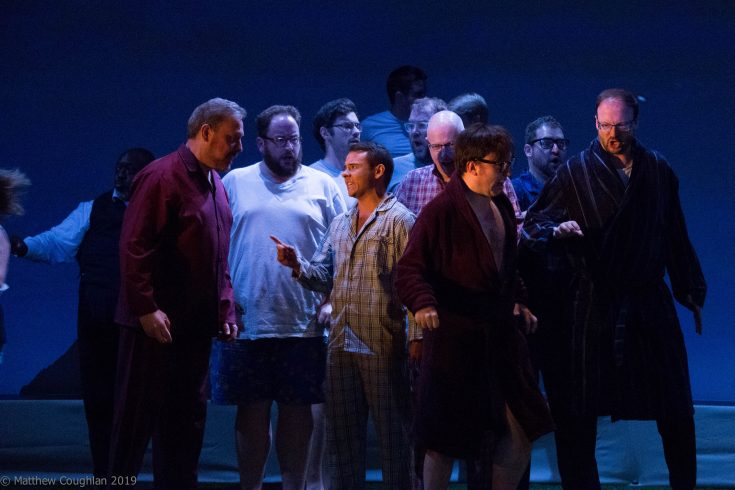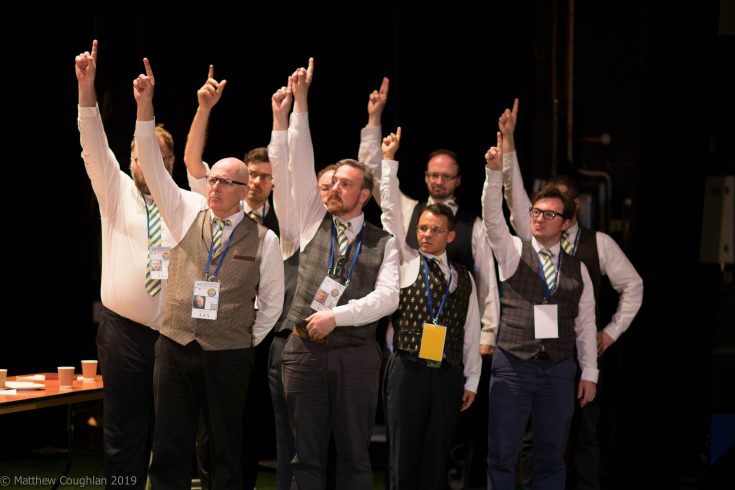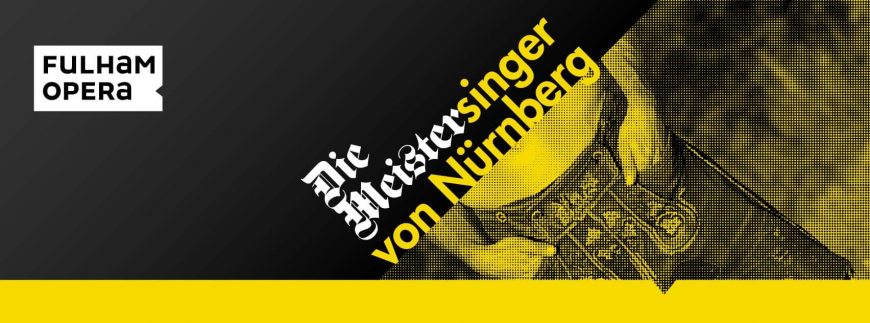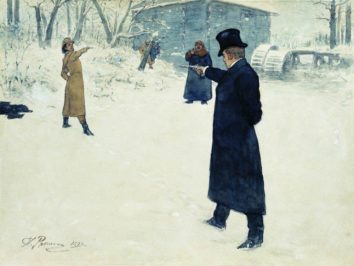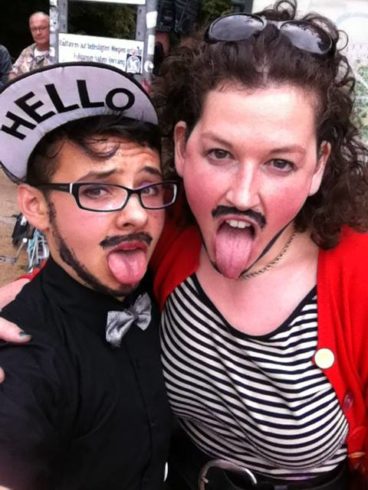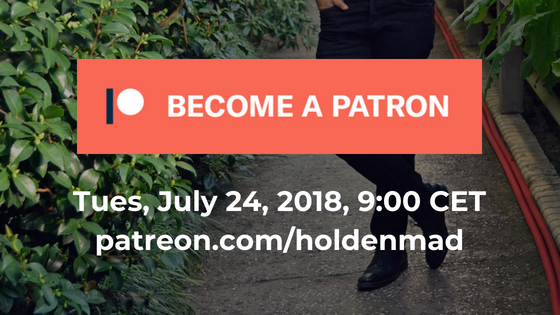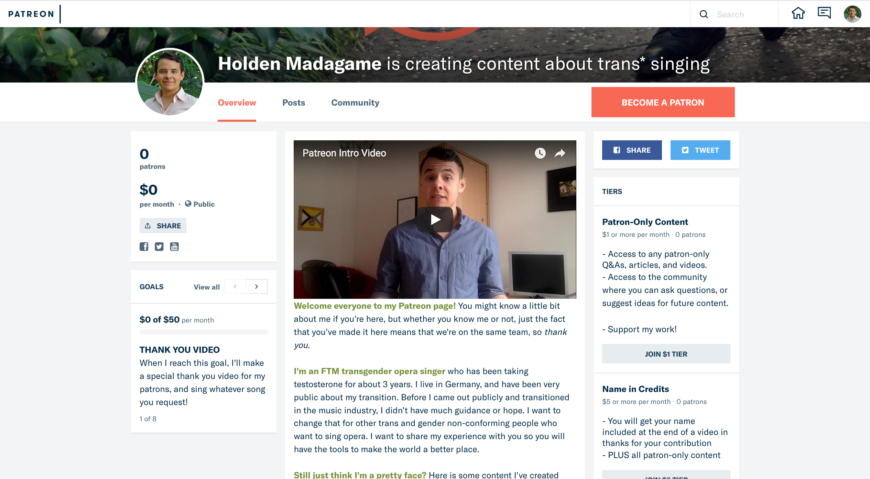One of the most common types of questions that people have about my transition is about my vocal transition: how has it changed, what changed, does it feel different, etc. I’ve written a few articles about these changes and will continue to update people on these changes. It’s important to document these things, because trans*singers need to know how their voices may change.
That all said, I do think that asking purely about physical changes contributes to the further medicalization and fetishization of trans* people.
“Whoaa, I don’t think you’re a fetish and respect you and your trans* experience! I’m just especially interested in your voice!” you will think or possibly say out loud. I know that already.
Fetishization doesn’t mean that you explicitly think of me as a fetish. It means that you’re overvaluing and giving unwarranted respect to the physical aspects of a trans* person’s transition. The most exciting things, and the things most trans* singers probably want to talk about are the experiential changes, such as the shift in repertoire, the change in operatic roles, and the everyday privileges that I notice as a masculine-presenting person in a patriarchal system, rather than as a feminine-presenting person, and vice versa.
I will say, that it doesn’t surprise me at all, because it’s something ‘special’ and different from what is considered normal in the classical singing world. Most people don’t change Fachs from mezzo to tenor…or do they?

I do think that trans* voices can be special and interesting, but I think that the media exoticizes them, to be honest. I don’t mind when people ask me questions about my vocal transition, but I end up feeling awkward most of the time, because it’s really not very interesting. My voice is a useful, standard tenor voice that is neither exceptional nor exotic in any way.
Vocal transition is something that people–especially people socialized as male–who grow up singing have to deal with at some point. “Male” voices break. Even the rest of the ‘side-effects’ of testosterone are the same: voice break, facial hair, change in hair quality, increase in muscle, etc. These are things that most people are familiar with in cisgender men, but find exotic and interesting in trans* men, because many of the effects happen quickly, there is no physical ‘growth’ like in a child/teenager, and because these changes alter your perception of our gender significantly.
Disclaimer: I will be using the term ‘boy soprano’ or ‘boy choir’ to refer to the voice of a person assigned male at birth. They can include cisgender males, trans women, and non-binary folk.
There are many western cultures with a history of ‘boy choirs’ who have hoards and hoards of prepubescent treble voices who eventually experience vocal transition during puberty. At this time, a soprano or alto voice must transition to tenor, baritone, bass, or possibly countertenor. Puberty can last between 2-5 years, at which point the voice can transition to any of these voice types.
Does this sound familiar?
It’s more or less the same as my own vocal transition, including the length of time. The only difference is that I’m about 15 years older than a person who goes through vocal puberty without prescribed hormones and that I have a degree in vocal performance. I have a lot of experience and knowledge to aid me in a vocal transition, and also the patience of an adult to bide my time when I can’t do much more. A ‘boy soprano’ on the other hand, has youth on their side. The vocal cords are more flexible, which means they can develop smoothly. It’s like having a shiny, new, well-oiled gear in a machine, rather than one that is a bit older and needs some love and care.
Additionally, society gives emotional space to young male voices that it just doesn’t give to trans* people. This is nothing new to trans* people, but worth emphasizing.
One thing I’d like to mention here is a significant fact that all voices change.
This is common knowledge in the operatic world, but just because you were a coloratura soprano when you were 20 doesn’t mean you’ll stay that way. Your voice will change, sometimes dramatically enough that you’ll have to transition to a different Fach. Tenors and basses have to do the same thing sometimes. It’s not just trans* people who have vocal transitions, cis people do too. At the very least the quality of a person’s voice changes as they grow older, if not the range. Often in a positive way, especially for operatic singing. An extremely common example of this is women who have a child, and have an extra hormone kick that can completely change their voice. I’d also like to address how Fach transition in cis singers also has to do with gender performance, but that’s for another day.
So, with this all said…why are people so interested in the trans* voice? I’m not complaining, because it allows me to share my experiences with people who would otherwise not care about trans* issues, but I do find it interesting and ironic that people who are interested in my voice, aren’t always interested in my personal experiences. This obsession with trans* bodies and our physiognomy is sometimes hilarious, and sometimes disturbing.
If you don’t know what I mean, here’s the quick version: trans* bodies are constantly being subject to questioning, medicalization, and fetishization. When people ask/talk about trans* people or the trans* experience, they often are asking about purely physical changes or experiences, such as what genitals we have, how we have sex, what do our scars look like, how often do we shave or not shave, etc.
The medicalization of trans*ness has been a huge problem for us. And to be honest, when people constantly ask about my body, it makes me feel like a cold body in an autopsy room, as if people would rather me dead to look at my insides and poke around at my vocal cords as they like. It makes me feel like my personal experience as a human being is being looked past and disregarded.
This blurb is a good summary of why medicalization of transness can be a problem:
“The negative implications on transgendered individuals extend not only towards the physical body but also to the mentality of the individual themselves. One main thing that has been felt among individuals who were dealing with medical professionals to alter their sex were dictated the perception of how they should act as an individual and how they should re-construct their identities as to what is seen a socially acceptable…One issue is that these individuals are seen as medical “problems” rather than individuals that just want to feel comfortable in their own body. Due to trans individuals seen as “problems” in the medical world, they are constantly going through various interventions and programs that end up making the individual feel like they are not “normal” and just problematic.”
UBC Wiki, Medicalization of Transgender Individuals
This last part is important. Medicalization makes us feel problematic, like we need to be solved, and like something is wrong with us.
If you don’t believe me, check out this article I found dealing with the transitioning of ‘boy’ voices through puberty. There are some pieces of advice that could be wonderfully applied to trans* voices/bodies, but most choral directors/voice teachers would not think to exercise this same kind of patience for an adult trans* person as they naturally would with a cisgender boy in puberty.
– Boys need constant encouragement that voice change is normal and indicates they are maturing.
– Be prepared to transpose at any time.
– Avoid associating gender with parts.
– Assure boys that voice change is normal and indicates they are maturing.
– Every voice change is unique.
– Frustration is common no matter what stage.
– “Be affirming for a boy that his vulnerability is human and acceptable. Once you understand that to be human is to be vulnerable, whether you are a boy or a girl, then you can go on and be brave, confident, and productive from a solid foundation. You don’t have to hide your vulnerability from yourself, and so you are not deeply afraid or fragile”.
SINGING SONS: Nurturing Boys’ Voices from Six to Sixteen, Dan LeJeune
You see this same mentality of allowing cisgender boys/men to have consideration for their feelings, when society doesn’t allow the same for trans* people. For example, avoiding associating gender with parts? If a choral director is happy to do that for a boy soprano, why not a transgender person? Or affirming that their frustration is valid? Why do we constantly affirm the anger and frustration of cisgender men/boys, and not the anger and frustration of trans* people in exactly the same situation?
Being interested in trans* voices may be meant well and is important to discuss, but ultimately you need to treat us as individual singers.
Teachers should be treating individual vocal issues regardless of gender identity. Coaches should be giving repertoire based on an individual, regardless of gender identity. Colleagues should be treating each other with respect as individuals, regardless of gender identity.
My existence should teach you that all of us deserve compassion, and that gender makes no difference. A cis woman should not be treated differently than a cis man, a trans* man shouldn’t be treated differently than a cis woman, etc.
I’d love to hear your own personal experiences with vocal transition, whether you’re trans* or cis!
Glossary of voice types:
- Typical ‘female’ voice types:
- soprano – highest typically ‘female’ voice type
- mezzo – middle to high voice type; often has a similar range to soprano but with a different quality of sound
- alto – low typically ‘female’ voice type
- Typical ‘male’ voice types:
- tenor – typically high range or resonance
- baritone – middle to low range
- bass – the lowest of this type
- countertenor – has a similar range to alto, mezzo, or soprano; different quality of sound
- Other terms:
- Fach – a voice category typically used for opera, but can be used in reference to choral voices
- treble voices – soprano, mezzo, alto voice types
Like what you’ve read? Want to see more? Head over to my Patreon and become a patron! You can support me with a monthly donation and join a lovely community of people who want the same. They help power my articles and videos, and help me afford the time to do the activism I want.
